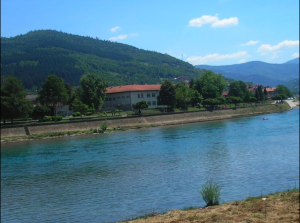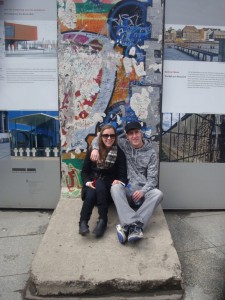Dakle, knjige i dalje ne prestaju da me fasciniraju! Svašta se u njima može naći, a, opet, čini mi se da, što više pronalazim, sve sam izgubljenija.
Rođena sam u Jugoslaviji. Kroz celu osnovnu školu učena sam o teškim žrtvama koje su za slobodu naše zemlje podneli razni partizanski junaci boreći se i pobedivši mnogo jačeg okupatora, o tome kako je, nekoliko godina kasnije naš voljeni predsednik, naš ponos i naša dika, rekao Staljinu svoje čuveno « Ne « i o tome kako smo mi srećan narod jer živimo u jednoj neutralnoj zemlji koja se velikim silama Zapada i Istoka oduprla svrstavši sebe u kategoriju nezavisnih, nesvrstanih zemalja.
Biti nezavisan od bilo koga, biti oslobođen stega, imati svoj identitet, a pri tome ići napred, sačuvati dostojanstvo i ne gubiti prijatelje, neprocenjiva je vrednost i jačina i pojedinca i društva. Upravo zbog te vrednosti, zbog te zavidne karakteristike i specijalnog mesta te naše, tadašnje zemlje u svetskoj geopolitici, biti Jugosloven zvučalo je i veće i jače od tog, tamo nekog, vidljivim i nevidljivim zidom podeljenog Sveta koji se, sa naše leve strane zvao Zapadni, a sa naše desne strane Istocni blok. Oni iz jednog Bloka nisu mogli u drugi Blok, mi smo mogli gde smo hteli, naročito u bratske nam, nesvrstane zemlje poput Indije, Egipta, Libije, Irana, Iraka, a skoro ceo veliki svet mogao je kod nas, u našu nezavisnu Jugoslaviju.
Nepremostiva gvozdena zavesa, ona vidljiva i ona nevidljiva, 1989. godine je, konačno, pala, pa su naše komšije sa istočne strane dobile « prozor u svet » i odmah okrenule glave ka zapadu. Nakon što se, 1991. godine, raspao Sovjetski Savez, narodi Istoka i Zapada, oni koje je zid delio punih pet decenija, valjda su se toliko poželeli, da su već 1993. godine rešili da stvore novu bratsku zajednicu nazvavši je Evropska unija.
Jedina koja je i ovog puta odlučila da bude posebna i drugačija, bila je naša nesvrstana Jugoslavija koja je, baš tih godina, počela da se kruni, da bi se, u teškim mukama i neizlečivim ranama, 1996. godine najzad potpuno raspala. Kažu da je bolovala i umrla sama i nezavisna od drugih.
Prošlo je od sahranjivanja Jugoslavije celih dvadeset godina, ali još uvek se sva vatra nije ugasila, niti se pepeo rasuo. Mi smo, u međuvremenu, postali razni. Menjali smo imena naših novih država, menjali smo nacionalnosti, vere, kontinente, države, jezike, kulture, prijatelje, neprijatelje, a sve to pokušavajući da održimo samo ono jedno, ono najvažnije čemu su nas, kroz celu osnovnu školu učili – identitet. I taman kad sam pomislila da smo u tome uspeli, kad smo, konačno, mnogo toga raščistili i sa sobom i sa drugima, u ruke mi dođe knjiga sa naslovom « Razgledanje izloga kroz Gvozdenu zavesu ». U knjizi umetničke, sjajno urađene fotografije skromnih izloga iz zemalja Istočnog bloka. Izlozi iz Sovjetskog Saveza, Čehoslovačke, Bugarske, Mađarske, Rumunije, Poljske, Istočne Nemačke i – Jugoslavije! Iza Zida. Iza Zavese. Bez svog jedinog, preostalog identiteta, onog istog zbog kojeg su nam svi toliko zavideli.

All this in English:
Regardless of how much I read, books do not fail to fascinate me! There is so much to find in them, however the more I find, the more I am confused.
I was born in Yugoslavia. In my primary school we learned about all the great sacrifices that our heroes who fought in the war and defeated the enemy stronger than them had made, about our president’s famous “NO” to Stalin, a few years after the war, and how we were a happy nation because we lived in a neutral country that, in front of the great powers of the West and the East, held its stand by aligning us in the category of the independent, the Non-aligned countries.
To be independent, to be freed from the chains, to have identity and dignity while making progress and not losing friends along the way, these are the values and a great power of a person and of a society. And for these reasons, for these envied characteristics, for our country’s special place in the geopolitics of the world at that time, being Yugoslav sounded better and stronger than anyone else in the world separated by the Curtain, visible and invisible, between the West, to our left and the East, to our right. Those from either side of the Curtain, they could not go across the Curtain, while for us there were not many boundaries and we could go where we wanted, especially to our fraternal, other Non-aligned like India, Egypt, Libya , Iran, Iraq. And, on top of that, almost everyone could come to us, to our independent Yugoslavia.
The Iron Curtain finally fell in 1989 and our neighbours from the East got a “window to the world” by turning their heads to the West. After the fall of the USSR in 1991, those who had been separated for 50 years had missed each other so much, that only a couple of years later, in the 1993, decided to unite themselves by forming a new fraternal country called European Union. The only country that decided to be special and different again was our independent Yugoslavia which, around that same time, started to crumble in the turmoil and finally died of an incurable disease, in the 1996. They say that she suffered and died alone, completely independent.
It’s been long since the burial of Yugoslavia, but the fire is still smouldering. Meanwhile, we have become different. We changed the names of our country, of our nationalities, our religions, we changed continents, languages, cultures, friends, enemies and all of that was done while trying to keep that one characteristic, the most important one that we’ve been taught in our primary schools – an identity. And just when I thought that we succeeded, just when it seemed that we have found solace with both ourselves and with others, I came across an English book, with an intriguing title. “The windows across the Iron Curtain.” Beautiful and artistic photos of the modest store windows in the Soviet Union, Bulgaria, Hungary, Romania, Poland, East Germany, Czechoslovakia and – Yugoslavia! Behind the Curtain. Without her last identity, the identity that died with her, the same identity for which everyone had envied her.

En français:
Donc, ces sont les livres qui me fascinent encore et encore! Il y a beaucoup des choses différentes qu’on peut trouver dans eux, mais, il me semble que des plus je cherche, le plus je suis confuse.
Je suis née en Yougoslavie. À mon école primaire on avait appris sur tous (les dures) sacrifices dures du (de) nos héros qui combattaient dans la guerre et ont vaincu l’ennemi plus forts qu’eux, sur notre président qui, quelques année après de la guerre, a dit son « No » célébré(e) à Stalin et comment nous sommes une nation heureuse parce que nous vivons dans un pays neutre qui a résisté à (aux) les grands forces de l’Ouest et de l’Est en se (nous?) mettent dans la catégorie de les pays indépendants, les pays Non-alignés.
Être indépendant, être libéré des chaînes, avoir son identité et sa dignité, mais dans le (en) même temps faire le (des?) progrès et ne pas perdre des amis, ces sont les valeurs et la force inestimables de la personne et de la société. Pour ces raisons, pour cette caractéristique envié, pour l’endroit spécial (la place spéciale) dans la géopolitique du monde de notre pays de ce temps-(là), d’être yougoslave a sonné (sonnait) mieux et plus noble que ce monde là, le monde séparé par le rideau visible et invisible, le monde de l’Ouest, de notre gauche et le monde de l’Est de notre droite. Ceux qui ont été d’un Bloc, ils ne pouvaient pas aller des les unes chez les autres, nous pouvions aller où nous voulions, particulièrement dans nos pays fraternelles, les autre pays Non-aligné comme l’Inde, l’Egypt, la Libye, l’Iran, l’Iraq. Presque tout le monde pouvait venir chez nous, en Yougoslavie indépendante.
Le Rideau de fer est finalement tombé en 1989. et nos voisins de l’Est ont gagné « la fenêtre sur le monde » en tournant leur têtes à l’Ouest. Après le chute de l’URSS, en 1991. les nations qui étaient (avaient) séparé pour (pendant) 50 ans, ont tellement raté (manquées) des (les) unes à les autres et (que), déjà en 1993., elles ont décidé de s’unifier en formant une nouvelle union fraternelle, L’Union Européenne. Le seul pays qui a décidé (d’)être spécial et different, cette fois encore, c’était notre Yougoslavie indépendante qui, autour de ces années, a commencé s’effriter pour être complètement mort(e) en 1996., dans la tourmente, d’une maladie incurable. On dit qu’elle souffrait et est morte seul, complètement indépendante.
Il y a longtemps depuis d’inhumation de la Yougoslavie, mais le feu n’a (ne s’est) encore pas éteint. En attendant, nous sommes devenus les divers. On a changé des noms (de) nos pays, des nationalités, des religions, des continents, des pays, des langues, des cultures, des amis, des ennemis, et tout ça était fait en essayant de garder cette chose (unique), la plus importante qu’ils ont nous appris dans nos écoles primaires – l’identité. Et en (au) moment quand (où) je viens de penser que nous avons réussi, quand je viens de penser que nous avons precisé(?) ça avec nous-mêmes et avec les autres, j’ai trouvé un livre anglais, avec son titre intrigant. « Les vitrines à travers le Rideau de fer ». Entre beaucoup des bonnes photos artistiques des vitrines modestes des pays de l’Est, l’Union Soviétique, la Bulgarie, la Hongrie (la Hongrie), la Roumanie, la Pologne, L’Allemande (de l’)Est, la Tchécoslovaquie et – la Yougoslavie! Derrière du le Rideau. Sans son identité dernier (dernière), cet (cette) même identité pour lequel (laquelle) tout le monde l’enviait.
To je posledica toga što u celom tom zapadnom svetu nisu ništa učili o Jugoslaviji, mnogi čak nisu znali ni gde se ona nalazi. Sve to zahvaljujući njihovom školskom sistemu.
O nama su znali uglavnom oni koji su bili radoznali i dolazili da upoznaju tu socijalističku Jugoslaviju sa kojom su se onda oduševljavali. Naša zemlja je tada bila bolje uređena od Švedske danas, i socijalno, i zdravstveno, i obrazovno, i humanitarno… Cvetali su nam industrija, turizam, ekonomija i sve što uz to ide. Od raspada Jugoslavije niko i ništa više nije bilo dobro, svim narodima je postalo neupordivo gore. Ulaskom u EU svi smo postali na gubitku.
Zbog svega toga bi nam najbolje bilo kad bismo se opametili i opet ujedinili u našu lepu i prelepu Jugu!